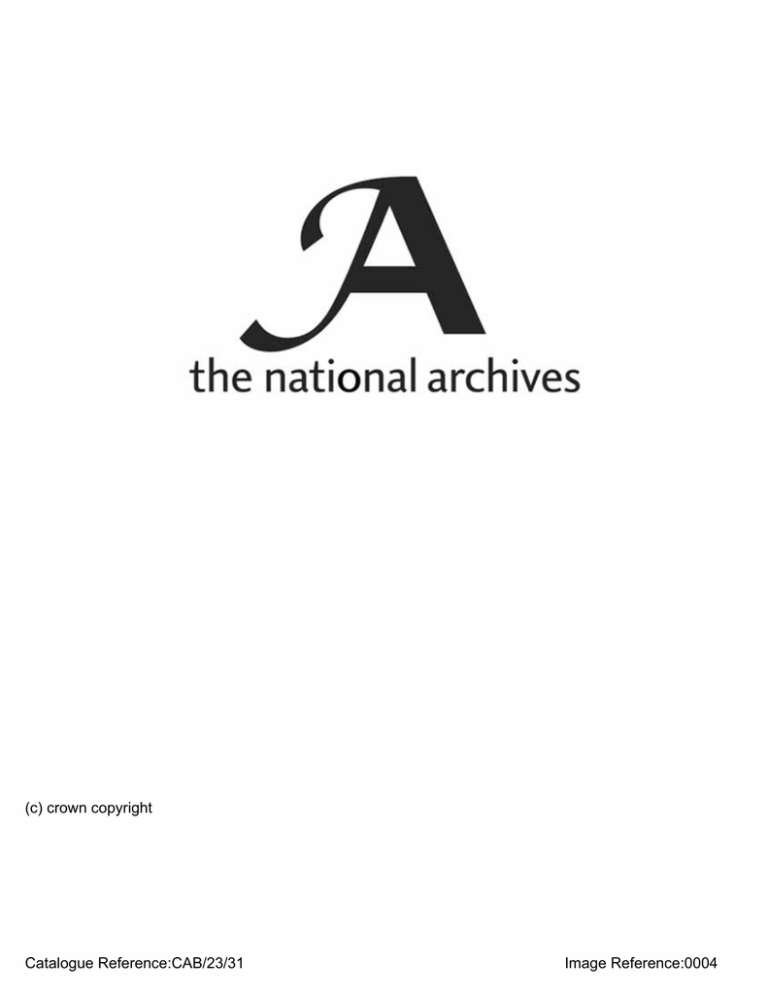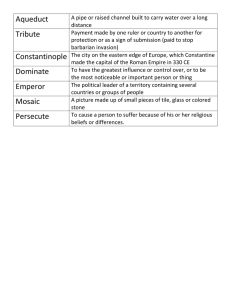(c) crown copyright Catalogue Reference:CAB/23/31 Image Reference:0004
advertisement

(c) crown copyright Catalogue Reference:CAB/23/31 Image Reference:0004 (fjiisj document is the property of Hie Britannic Majesty a Government) 1 SfiCE&T. C A,,B, l,4.,E,.T &!/££. ir r CONCLUSIONS of a meeting of the Cabinet held at so. I Q downing street, JS.W. , on Monday, S£*th September, X**££, at l&nooa' i fi £ S E U ,--!£.1 The Prime Minister (In the chair) the Right Eon. A. Chamberlain,M.P, Cord irivy Seal. The Eight hen. Viscount Bir&eahe&d, Lord chancellor. j?he Hight Hon. Sir Robert H o m e , &.B.H. ,LDi ,M.P. , Chancellor of the ££chequer. The Bight Hon. B.shortt, E.O. ,J$.P.., Secretary of state for hose Affaire. £gge Moat Hon. Marquess Carson ' of jjtedlestoa. A.G. ,G.G.S.i. ,G.C I.E., Secretary of State for Foreign Affairs. The Right Boa. i.3. Churchill, M.P. Secretary of State for the- colonies. 'Ihe Right Hon. Sir L.VsorthiagtonEvansj, Bart., G.B.B. .M.3?. , Secretary of State for War. The Right Hon. Lord Lee- of Fare-ham, G.B-.E. ,iL.G.B., First Lord of the Admiralty, (lie Right Hon. air A.GriffithiMacewen, , Minister of -Agriculture and Fisheries. The Right Hon. l.J. &acnamara, &.B., Minister of Labour. She Right Hon. Sir Hamar Greenwood, Bart., A.C.M.P., Chief secretory for Ireland. The Right Hon. Earl of Crawford and Baleerres, A.T., First Commissioner of Works. The following were also present .T iv, Grigg, A. C. V .0. ,C.M.G. f eneral the ^arl of Cavan, X.P.. B.C.H.G. ,G.C.y.G. . A.i).CGen. , Bhief of the Imperial General Staff. Admiral of the Fleet Earl Beatty, G.CB..0.M..G.C.V.O.,B.S.O., First Sea Lord. Air Chief Marshal sir E.M.Trenehard, Bart. ,A,CB. ,B. S.O. ,A. D.C , Chief of the Air Staff. lieut.-col. Sir M.P.A. Ha8&ey G.C.B. , secretary liieut.-Col. sir J.R. Chancellor,A.CM.G. .D.S.G. ,.... Principal Assistant secretary, C L P . t THE CRISIS IN THE BEAR EAST. Cabinet's Gcngratu­ lations to Lord iurzon. 1. The Frime Minister, on behalf of the Cabinet, offered his cordial felicitations to the Secretary of State for Foreign Affairs on the result of his mission and on the very skilful way in which he had conducted the negotiations. The Cabinet, before Lord Curzon had left for Paris, had been alive to the difficulties, but these had proved even greater owing to M. Poincare' a attitude, and the result was due to the firm handling of the situation by Lord Curzon. In these circumstances it was the more satisfactory to record that the Allies had reached unity in regard to their first atti­ tttde towards Mustapha Kemol. On behalf of his colleagues, therefore, he tendered warm congratulations. The Secretary of State for Foreign Affairs thanked tho Cabinet both for their congratulations and for their support.g^s^xkscxkkixx^xtKgxgscls^nKkx At no point did the Prime Minister and his colleagues fail to give complete support, going even beyond what he had asked for, and the trust- and wide latitude given to him had contributed material ly towards the result of the Conference. THE SITUATIOH IN \ :. THE BEAR EAST a 1 Invitation to Mustapha kemal: Lord Curzo^s negotiations in Paris. / 2. With reference to Cabinet 50(22) Conclusion 4, THE SECRETARY OP STATE FOR FOREIGN gave his colleagues a full account of his negotla­ tions with M. Poincare as described in his various telegrams from Paris and in the British Secretaries Notes of the Meetings, some of which had already been circulated. Among the points which Lord Curzon more particularly emphasised may be mentioned the following. - M. Poincare had wished to include in the portion of the Note in regard to the future frontiers of Turkey, the words "in accordance with the full terras of the national pact", but Lord Curzon had refused to agree to this; the draft proposed by the British Cabinet (Appendix to Cabinet 50 (22)) had provided for the return of Eastern Thrace to Turkish sovereignty: Curzon, however, Lord had succeeded in obtaining more favourable conditions than this as the Allied Note provided that Turkey should recover "Thrace, as far as the Maritza and Adrianople". The Cabinet s 1 draft had suggesteu the withdrawal of the Greek forces behind the line of the Maritza. In the Allied Note, Lord Curs on had succeeded in arranging that the line should be fixed by the Allied Generals in accord with the Greek and Turkish military authorities at the Mudania Conference. M.Poincare had wished to convert the Mudania Conference into a preliminary Conference, but Lord Curzon' had insisted thai/the Conference should be confined to a single point, namely, the settlement of the line .,..behind which the Greek forces should he withdrawn. When the peace Conference took place, the/British Government would be opposed, everywhere by France and Italy * Some support might be obtained at the Conference from Serbia and Roumania, but these countries were very much afraid of France and could not be counted on in the least to supply any force to maintain the position at the Straits in the meanwhile. He thought that France was relieved Frtn-ck. at our attitude and that the^could be countec on seriously to support us in the negotiations to promote a Conference in accordance with the terms of the Mote. In reply to a question as to why the zones whieh the Angora Government was asked not to enter, either before or during the Conference, had been referred to as "zones which had proyisl^onally; been declared neutral" , lord Curson explained that M.Poincare had insisted on the insertion of the word "provisionally" partly on the ground that the line had been laid down in 1921 and published by the Allies but not accepted by Mustapha JKemal, and partly because he wanted to leave the Allies free themselves not to regard this line as permanent. Apart from the congratulations to Lord Curzon, which tuere recorded above in Conclusion 1, the comment was made at the Cabinet, without any dissent being expressed, that the French desertion of the British troops at Chanak was a most formidable historical event. THE SITUATION IN THE NBAS EAST. Publicity in regard to Military Movements: Attitude of the Press. 3. After completing his review of the Paris negotiations, THE SECRET ART OP STATE FOR FOREIGN AFFAIRS warned the Cabinet that it was very probable that Mustapha Keraal would insist as a condition of the Conference, on the withdrawal of the British troops from the Asiatic side and p. rticularly from Chanak. In these circumstances it would be preferable from a political point of view, either that we should desist from sending further troops, or at le ast, that the present wide publicity given in the Press to the movements of our Naval, Military and Air forces, should cease. The view was expressed that it would be dangerous to cheek the arrival of reinforcements. As regards the Press, it was pointed out that several important newspapers were still opposed altogether to the Government's policy and would almost certainly refuse not to publish movements of troops. Early in the present crisis the London newspapers had been induced to desist to a certain extent from such publication, but later, they had represented that the movements of troops were being published, locally both at home and abroad,,,and now wider publicity was being given to all such movements. On a review of the above, the Cabinet agreed: \ \ That short of the establishment of a censorship, which was not at present.desirable, no action could usefully be taken to induce the newspapers to refrain from publish­ \ ing particulars of the movements \ of our forces. i . ­ TEB CRISIS \ 4. The Secretary of State for War read tele grama which $$jfeTHE NEAR ! BffST. I he had received from General Harington, reporting the The Naval and arrival at and subsequent withdrawal of ^u^kiah Cavalry Military Sit­ nation. \ from Irenkeuy. He added that the reports that troops were Tjfr^altfeaenr^ihmtnp conveyed by rail from Smyrna to Ismid had/hot been to prevent / Passage of /confirmed. Straits. The First Sea Lord made a statement as to the action that could be taken by the Navy to oppose an advance of the Kemalists along the Ismid Peninsula. Lord Beatty stated that he had discussed the situation with Admiral Webb, who had recently returned from the Wear T?ast. Admiral Webb was of opinion that the Navy could play a great part in prevsnt­ ing the advance of the troops along the Peninsula to Scutari. He said that the railway to Scutari, which ran along the sea­ shore, could easily be destroyed by a Destroyer. One road ran parallel to the railway on the southern side of the Peninsula, and was equally exposed to the fire of ships. There was another road running parallel to the shore on the northern side of the Peninsula, which was also exposed to fire, but in a lessor degree. Finally, there was a military road which had beer: constructed by us,/one-third e-f jrhiefa !fcay enfrho^southern side of the Peninsula andT two-thirda^wfte­ flnlanfl. Parts of this road could be commanded by the Navy and the Air Force, which, together, could, do a good deal to hamper an advance in force of troops along the Peninsula. It must, of course, be understood that he made that state­ ment on the assumption that we still held Constantinople and the European shore of the Bosphorus. If Constantinople were abandoned, an advance of the Kemailst troops along the Ismid Peninsula could not be prevented by purely naval action,for 4 that eventuality it would be necessary to withdraw our naval forces from the Black Sea. Rven in those circumstances the advance of the Kemalist troops, could be delayed and hampered by naval and aerial action. Lord Beatty then referred to Sir Horace Rurabold a telegram Mo .451, pointing out the serious f situation that w o l d - b e created i n Constantinople if the Wavy were - to carry out their instructions regarding the removal of shipping from the Bosphorus and shutting it up in the Golden H o r a ? ^ reaifeed that it might b e necessary, for 0 political reasons, to delay"taking action to control the shipping until the last possible moment, but he desired to point out the difficulties o f the Ns?ral Commander would and thereby be greatly increased, because the removal saj£ control of a large number of craft in the Bosphorus and the neigh-­ bearing waters would take some time to complete. The Chief of the Imperial General Staff stated that it must be realised that no material assistance could b e looked for from the French and Italian troops in opposing a Kemalist advance o n Constantinople. It was even doubtful if they would co-operate with the British troops in maintaining order in Constantinople. He explained it was not the military policy to withdraw from Constantinople before we were compelled to do so- Instructions had been given to General Harington that' w e regarded Chanak and the Gallipoli Peninsula as of primary importance; Constantinople came second, and the Ismid Peninsula third In order o f Importance. General Karing­ ton fully intended to remain at Constantinople and to keep order there as long as he was able to do so with the limited forces at his disposal. The defence o f Constantinople against a Kemalist attack was an altogether different matter. It would be quite impossible for him to resist such an attack. **i^x^hevxl8yeeRmotsrxstx554esrxd4?93rs*35xx It w a s stated that there were mow SO,000 armed Turks in Constantinople. attack on Constantinople were threatened, If an these 20,000 Turks would surround our small force, which would be in great danger of being cut off. It was' clear, therefore, that if an. attack on Constantinople took place our troops must withdrawn to the Gallipoli Peninsula. -.6­ be The Prime Minister expressed the opinion that it was desirable to examine that situation more closely. General -enit$t. Ha ring ton had stated that he could -aaa^ SO, 000 citizens of Constantinople to foam a Civil Guard to help in the main­ tenance of order. That force would be supportedby the British detachment. If it became clear, in the course of the next few days, that the safety of Chanak was assured and that no serious attack on that place was contemplated, it might be possible for General Harington to transfer some -from. of his troops to' Chanak, to Ismid and to Constantinople. He drew the attention of the Chief of the Impsrial General t Staff to Lord 3eatty*s statement that all the approaches to Ismid Peninsula, were exposed to naval gunfire, and en­ quired how that new consideration affected the opinion of" the General Staff, He agreed that it was most important that pur small force in Constantinople should not be allowed to become entangled in street fighting, The Chief of the Imperial General Staff replied that the points raised by the Prime Minister had been very closely studied. He was strongly of opinion, from his experience of the late War, that the advance of a Turkish Army along the Ismid Peninsula could, not be prevented by naval action. Naval gunfire could, no doubt, harper an advance, but it could not prevent an elated and. determined army from advancing. General Harington would, no doubt, remain in Constantinople as,long as he could safely do so. It was certain that as soon as an attack on Constantinople was developed there would be a simultaneous rising in the City, and in fact our General was operating from a hostile Gapital. The.view was expressed that we had no choice but to withdraw from Constantinople if Mustapha Kemal advanced alon- the Ismid Peninsula. Our troops would then have to be transferred to Gallipoli. We could not be held to blame for the withdrawal; the responsibility lay with the French, Italians, Serbians and Roumanians, who h a d declined to give us military support. In vie?; o f the critical situation in Constantinople it was most important that no measures'of a provocative character, such as interference with the shipping necessary fore the economic life of the City, should b e taken at tbe present time. The Secretary of State for the Colonies called attention to the fact that General Harington had reported that the perimeter of the position at Chanak was only four miles, and not 15 tulles as had been previously understood. This fact materially affected the value of the position of Chanak to secure the freedom of navigation of the Dardanelles, for the Turks would find no difficulty In establishing positions on the shore of .the Dardanelles either Worth or South of Chanak. The First Sea Lord stated that he entirely agreed with General Harington that the Wavy should take no action at present which might h a v e the result of precipitating a crisis in Constantinople, but he pointed out that If we w e r e at w a r at Chanafc w i t h t h e Kemalists w e could not remain at peace with them at Constantinople * If the Wavy w e r e given carte bjancha and sufficient time, they could remove all craft from the Bosphorus and its neighbourhood and prevent Kernel 1st forces from entering Constantinople. the If the Wavy were not allowed to take measures for controlling the shipping until an attack by the Kemalists was imminent and the troops were withdrawn from Constantinople, it would not be possible for the Wavy alone to deny the passage o f the Bosphorus to the Keraalist forcea, Attention w a s drawn to the point that if the British forces were withdrawn from Constantinople while the French and Italign forces remained, we should be charged with -8­ 10 abandoning our Allies, j u s t PJ as we bad charged the French and Italians with abandoning us at GhanaIs.. The Secretary of State for Foreign Affairs pointed cut t h a t Kemal- Pasha was in Pelle. comraunication with General d a i l y He did not believe that Mustapha Kemal intended to advance against Constantinople, as the French were strongly opposed to his doing so and were using all their influence to induce him to adopt a moderate attitude. In reply to a n enquiry b y the Prime Minister, the Chief of the Air Staff stated "weple^could h i n d e r a n d t h a t delay the airfereesnow a a-t-G-eRetanti­ Turkish advance along the Ismid Peninsula, but that they could not guarantee t o stop such an advance. &^-4ho f i cl o n t o n g t h for - t h a r t - pur po o e. The Cabinet agreed — o of , t h o -a*rr- -fore-e..av-aiAab-le-qpae Ax^^y '& sfefi 4Cfn*.. 1 yB CONCLUSIONS REACHED BY THE GABINBT IN RF&A^D TO Tm tmfiz Am M I L I T A R Y S I T U A T I O N I N THE IJ15AB HAS$ - September 35, 1928. (a) That It was .necessary to recognise the raw fact that, in present circumstances, the conditions postulated hy the First Sea Lord as essential to the interdiction by the Navy of the passage ef the Turkish Nationalist troops [i suffi(vis."if given carte-blsnobe^fco control of all trans­ lent time /. ports" - Conference of Minis tore, September 19th, Conclusion (l) ) are rot fully realisable, and that our power to bold Const an tinople is less because the naval precautions the Admiralty had contemplated would pro­ cipitate very serious trouble in Constantinople itself, and that Kh.ll discretion most be left to the men on the spot, (b) That, in view of (a), the Admiralty, *ar Office and Foreign Office should respectively notify the Jfeval Comsander-inGhief, the 0-enoral Officer Commanding-in-Chl^f and the High commiesioner at Constantinople, that the Sabinet had considered Sir Horace 8ttmboId*s telegram Mo.450 and con­ enrred in the oreposal in the penultimate paragraph that full latitude should be left to the men on the spot (viz., the .*disiral, the n^neral. and the - lgh Commissioner), in who?? the Government have complete confidence, in regard to the qtiestions raised. f r (e) That the Naval Cona^nder-in-GhiRf was absolved from re spore ­ ibility for any effect on his original plans owing to the above decisions and that the Admiralty should add in their telegram to the Naval o^an dor-in-Chief that it was recog­ nieed that the effectiveness of measures for the control of shipping would be impaired by delay. (d) That the above decisions (a) ami (b) should not preclude the further consideration of possible stops to prevent the crossing of the Straits by the Turkish Nationalists, 1 (e) To take note that,according to statements by the First Sea Lord and the Chief of the Air Staff, the naval and aerial forcers can hamper, delay and embarrass, but not prevent, the approach of thte Turkish National int. troops to the Bosphorus. (f) To take note that the Secretary of State for War had in­ formed General Harington that the General s view was agreed to that he should hold Chanak and Oallipoli at all costs and, provided that his task at Ohanak was not endangered, should retrain at Constantinople as Ion? as it was possible to do so (C-eneral Faring ton's telegram Fo.2335, of SepteSft­ ber 28, 1.9S2) . 1 (g) To take note that General Harington has decided not to utilise tho 1,000 men (without rifles) of the Royal Air Force, who are now in the Mediterranean on board the S.8. BRAEfMR CASTLE en route to Mesopotamia. GREEK BATTLE-\ - *5. Secretary of State, for War read a telegram from SFTH? A H ) ' i ' DESTROYER AT the H i g h Commissioner (TIo.45S) reporting the presence of a C ONSTANTT-NORLIS. ! ...,.^Greeh Battleship and Destroyer at Constantinople. ' j It-was agreed that it was very undesirable that i these ships should remain in the neighbourhood of Oenstantinople ,'''-Xt was pointed out that, if asked to withdraw V ,7,,, [* ., 1 t ! Constantinople to protect the Greek population of the City y [ " . in the event of disturbances. I The First Sea Lord stated that- the ships could remad I . *. / / - V/ tf i' at the Greek port o f Rodosto until the need for there at h ' '" :l I them, i the Greek Government would say thafe-' these ships had gone to '-' If $i^k i ; vA y '-; i: Constantinople arose. i The Cabinet agreed \ % I I — That the Secretary of State for Foreign Affairs should make representations at Athene to secure the withdrawal o f the Greek warships from Constantinople. 10 5 V While the Cabinet were dispersing, THE PRIME MINISTER and the LORD PRIVY SEAL authorised the Secretary of the Cabinet to make arrangements for a Committee, composed as follows :Sir John Chancellor (in the Chair); Representatives of the War Offi ce ­ (Secretary's Department and General Staff); Representatives of the Admiralty ­ (Secretary*s Department and War Staff); Representatives of the Air Ministry ­ (Secretary's Department and Air Staff); Representatives of the Foreign Office ­ (Secretarial Staff and Legal Department); Representatives of the Board of Trade ­ (Secretarial Staff ); Representatives of Colnial Office and India Colonel Walker - Secretary Office; to meet, with authority to call in as required, representatives of other Departments, for the purpose of examining the War Book and reporting'to the Cabinet as to what parts of the War Book should be put in operation In the event of hostilities with the Turkish nationalists. ipjfissioN ^IRELAND 0 TTTF faAmi, OF 7. The Prime Minister drew the attention of the Cabinet to two telegrams received from Geneva (Nos.49 and 51) in which Lord Pal four asked for the views of the Cabinet in regard to Ireland's entry into the League of Nations. From these telegrams it appeared that a Mr. MaoWhite, who repre­ sented himself as the agent of the Irish Free State, -was putting it about, that difficulties were being made by His Majesty'a Government as to Ireland s admission to the 1 League. Lord Balfour ashed for authority to let it be known, formally and informally, that the British Government wonId view with satisfaction the conditional admission of Ireland into the League, supposing, as he thought was probable, that an immediate admission was not practicable under Article I of the Covenant. If such conditional membership was refused, be desired that the responsibility should not be on the Brit­ ish Government, but on the Assembly. He presumed that the form of the Irish application should be that she should become a member if and when the Constitution should become fi rial ly e ffe c t iv &. The Secretary of State for the Colonies explained that there had been a motion in the Irish Parliament regard­ ing the admission of the Irish Free State into the League. The motion had been opposed by the Free State Government, whose view it was that tbe Free State should not apply for admission to the League until the Constitution had been passed. It was incumbent upon Fis Majesty s Government to 1 support the "Fce^ State Government on the question. \ The Cabinet agreed \ ­ That the Secretary of State for the Colonies should advise the Prime Minister the same afternoon as to the reply to be sent to Lord Balfour. 2, Whitehall hardens, S.W.1, September 25, l 0s5 2.







